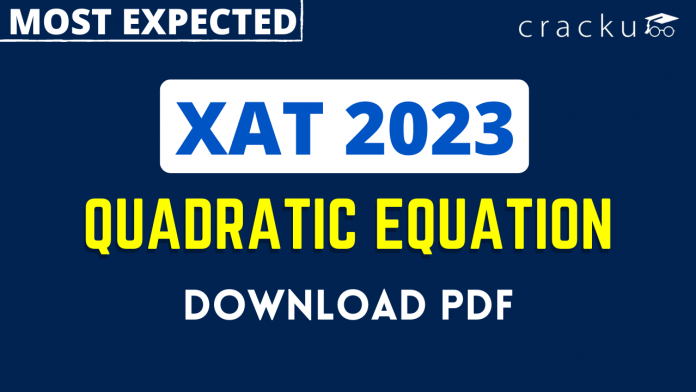XAT Quadratic Equations Questions PDF [Most Important]
Download Quadratic Equations Questions for XAT PDF – XAT Quadratic Equations questions pdf by Cracku. Practice XAT solved Quadratic Equations Questions paper tests, and these are the practice question to have a firm grasp on the Quadratic Equations topic in the XAT exam. Top 20 very Important Quadratic Equations Questions for XAT based on asked questions in previous exam papers. The XAT question papers contain actual questions asked with answers and solutions.
Download Quadratic Equations Questions for XAT
Enroll to XAT 2023 Crash Course
Question 1: If $a^3 – b^3 = 899 and a – b = 31$, then $(a – b)^2 + 3ab$ is equal to:
a) 31
b) 35
c) 16
d) 29
1) Answer (D)
Solution:
Given, $a^3-b^3=899$ and $a-b=31$
$=$> $\left(a-b\right)\left(a^2+ab+b^2\right)=899$
$=$> $31\left(a^2+ab+b^2-2ab+2ab\right)=899$
$=$> $\left(a-b\right)^2+3ab=\frac{899}{31}$
$=$> $\left(a-b\right)^2+3ab=29$
Hence, the correct answer is Option D
Question 2: If $(x – 7)^3 + (2x + 8)^3 + (2x – 3)^3 = 3 (x — 7) (2x + 8) (2x — 3)$, then what is the value of $x$ ?
a) 1.6
b) 0.4
c) 2.4
d) 1.2
2) Answer (B)
Solution:
Given, $(x – 7)^3 + (2x + 8)^3 + (2x – 3)^3 = 3 (x — 7) (2x + 8) (2x — 3)$
$=$> $(x – 7)^3 + (2x + 8)^3 + (2x – 3)^3 – 3 (x — 7) (2x + 8) (2x — 3)=0$
We know that if $a^3+b^3+c^3-3abc=0$ then $a+b+c=0$
$=$> $\left(x-7\right)+\left(2x+8\right)+\left(2x-3\right)=0$
$=$> $5x-2=0$
$=$> $x=\frac{2}{5}$
$=$> $x=0.4$
Hence, the correct option is Option B
Question 3: If $(x – 8)^3 + (2x + 16)^3 + (2x – 13)^3 = 3 (x – 8) (2x + 16) (2x – 13 )$, then what is the value of $x$ ?
a) 1
b) -1
c) 0
d) 0.7
3) Answer (A)
Solution:
Given, $(x-8)^3+(2x+16)^3+(2x-13)^3 = 3(x-8)(2x+16)(2x-13)$
$=$> $(x-8)^3+(2x+16)^3+(2x-13)^3-3(x-8)(2x+16)(2x-13)=0$
We know that if $a^3+b^3+c^3-3abc=0$ then $a+b+c=0$
$=$> $\left(x-8\right)+\left(2x+16\right)+\left(2x-13\right)=0$
$=$> $5x-5=0$
$=$> $x=\frac{5}{5}$
$=$> $x=1$
Hence, the correct option is Option A
Question 4: If $(x + 7)^3 + (2x + 8)^3 + (2x + 3)^3 = 3 (x + 7) (2x + 8) (2x + 3)$, then what is the value of $x$ ?
a) 3.6
b) -3.6
c) 2.4
d) -2.4
4) Answer (B)
Solution:
Given, $(x+7)^3+(2x+8)^3+(2x+3)^3 = 3(x+7)(2x+8)(2x+3)$
$=$> $(x+7)^3+(2x+8)^3+(2x+3)^3-3(x+7)(2x+8)(2x+3)=0$
We know that if $a^3+b^3+c^3-3abc=0$ then $a+b+c=0$
$=$> $\left(x+7\right)+\left(2x+8\right)+\left(2x+3\right)=0$
$=$> $5x+18=0$
$=$> $x=\frac{-18}{5}$
$=$> $x=-3.6$
Hence, the correct option is Option B
Question 5: If $(x – 3)^2 + (2x – 5)^3 + (x – 4)^3 = (3x – 9)(2x – 5)(x – 4)$ , then what is the value of $x$ ?
a) 2
b) 5
c) 4
d) 3
5) Answer (D)
Solution:
The best way to solve such questions is by substituting the options given :
On substituting x=3
we get LHS = 0
And RHS =0
so we get x=3
Instructions
In the following questions two equations numbered I and II are given. You have to solve both the equations and
Give answer a: if x > y
Give answer b: if x ≥ y
Give answer c: if x < y
Give answer d: if x ≤ y
Give answer e: if x = y or the relationship cannot be established.
Question 6: I. $2x^{2}+21x+10=0$
II. $3y^{2}+13y+14=0$
a) if x > y
b) if x ≥ y
c) if x < y
d) if x ≤ y
e) if x = y or the relationship cannot be established.
6) Answer (E)
Solution:
I.$2x^{2} + 21x + 10 = 0$
=> $2x^2 + x + 20x + 10 = 0$
=> $x (2x + 1) + 10 (2x + 1) = 0$
=> $(x + 10) (2x + 1) = 0$
=> $x = -10 , \frac{-1}{2}$
II.$3y^{2} + 13y + 14 = 0$
=> $3y^2 + 6y + 7y + 14 = 0$
=> $3y (y + 2) + 7 (y + 2) = 0$
=> $(y + 2) (3y + 7) = 0$
=> $y = -2 , \frac{-7}{3}$
$\therefore$ No relation can be established.
Question 7: I. $3x^{2}+10x+8=0$
II. $3y^{2}+7y+4=0$
a) if x > y
b) if x ≥ y
c) if x < y
d) if x ≤ y
e) if x = y or the relationship cannot be established.
7) Answer (D)
Solution:
I.$3x^{2} + 10x + 8 = 0$
=> $3x^2 + 6x + 4x + 8 = 0$
=> $3x (x + 2) + 4 (x + 2) = 0$
=> $(x + 2) (3x + 4) = 0$
=> $x = -2 , \frac{-4}{3}$
II.$3y^{2} + 7y + 4 = 0$
=> $3y^2 + 3y + 4y + 4 = 0$
=> $3y (y + 1) + 4 (y + 1) = 0$
=> $(y + 1) (3y + 4) = 0$
=> $y = -1 , \frac{-4}{3}$
$\therefore x \leq y$
Question 8: I. $2x^{2}-11x+12=0$
II. $2y^{2}-19y+44=0$
a) if x > y
b) if x ≥ y
c) if x < y
d) if x ≤ y
e) if x = y or the relationship cannot be established.
8) Answer (D)
Solution:
I.$2x^{2} – 11x + 12 = 0$
=> $2x^2 – 8x – 3x + 12 = 0$
=> $2x (x – 4) – 3 (x – 4) = 0$
=> $(x – 4) (2x – 3) = 0$
=> $x = 4 , \frac{3}{2}$
II.$2y^{2} – 19y + 44 = 0$
=> $2y^2 – 8y – 11y + 44 = 0$
=> $2y (y – 4) – 11 (y – 4) = 0$
=> $(y – 4) (2y – 11) = 0$
=> $y = 4 , \frac{11}{2}$
$\therefore x \leq y$
Question 9: I. $5x^{2}+29x+20=0$
II. $25y^{2}+25y+6=0$
a) if x > y
b) if x ≥ y
c) if x < y
d) if x ≤ y
e) if x = y or the relationship cannot be established.
9) Answer (C)
Solution:
I.$5x^{2} + 29x + 20 = 0$
=> $5x^2 + 25x + 4x + 20 = 0$
=> $5x (x + 5) + 4 (x + 5) = 0$
=> $(x + 5) (5x + 4) = 0$
=> $x = -5 , \frac{-4}{5}$
II.$25y^{2} + 25y + 6 = 0$
=> $25y^2 + 10y + 15y + 6 = 0$
=> $5y (5y + 2) + 3 (5y + 2) = 0$
=> $(5y + 3) (5y + 2) = 0$
=> $y = \frac{-3}{5} , \frac{-2}{5}$
Therefore $x < y$
Question 10: I. $x^{2}-3x-88=0$
II. $y^{2}+8y-48=0$
a) if x > y
b) if x ≥ y
c) if x < y
d) if x ≤ y
e) if x = y or the relationship cannot be established.
10) Answer (E)
Solution:
I.$x^{2} – 3x – 88 = 0$
=> $x^2 + 8x – 11x – 88 = 0$
=> $x (x + 8) – 11 (x + 8) = 0$
=> $(x + 8) (x – 11) = 0$
=> $x = -8 , 11$
II.$y^{2} + 8y – 48 = 0$
=> $y^2 + 12y – 4y – 48 = 0$
=> $y (y + 12) – 4 (y + 12) = 0$
=> $(y + 12) (y – 4) = 0$
=> $y = -12 , 4$
$\therefore$ No relation can be established.





